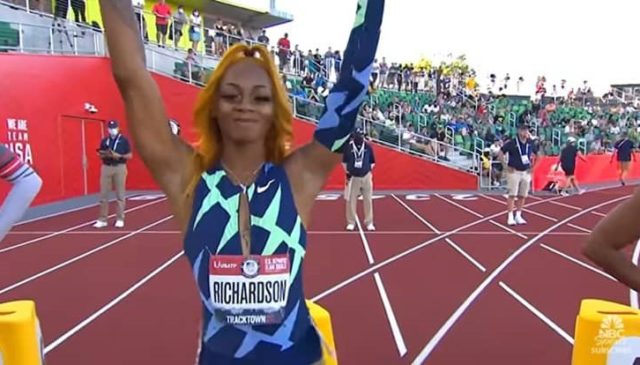
The Olympic dream for American sprinter Sha’Carri Richardson has been crushed by cannabis.
The 5-foot-1 track and field star rose to fame in 2019 as a freshman at Louisiana State University, where she clocked 10.75 seconds in the 100-meter dash to break the NCAA record.
On June 19, Richardson won the 100 meters during the U.S. Olympic Trials in Eugene, Ore., where the 21-year-old stopped the watch at 10.86 seconds to punch her ticket to the Tokyo Olympics that are scheduled to begin July 23. That’s the exact same time it took to land a top-three podium spot during the 2016 Olympics in Rio de Janeiro. Richardson’s personal best of 10.72 seconds is the fastest time in the world this year.
But Richardson’s Tokyo aspirations were halted July 1, when it became public she tested positive for tetrahydrocannabinol (THC), the main psychoactive component found in cannabis, from a urinary sample collected during the team trials, as first reported by Jamaica Gleaner.
Since Jan. 1, 2021, cannabis has been classified as a “Substance of Abuse” by the World Anti-Doping Agency and currently carries a maximum four-year ban. However, the U.S. Anti-Doping Agency (USADA) said in a statement July 2 that Richardson accepted a one-month suspension—as permitted under the applicable international rules.
“The rules are clear, but this is heartbreaking on many levels,” USADA CEO Travis T. Tygart said. “Hopefully, her acceptance of responsibility and apology will be an important example to us all that we can successfully overcome our regrettable decisions, despite the costly consequences of this one to her.”
According to the USADA, the 2021 World Anti-Doping Code newly classifies THC as a Substance of Abuse because it is frequently used in society outside the context of sport. Should an athlete who tests positive for a Substance of Abuse establish his or her use of the substance occurred out of competition and was unrelated to sports performance, the athlete would receive a three-month sanction. However, if the athlete satisfactorily completes a Substance of Abuse treatment program approved by USADA, the sanction may be further reduced to one month.

NBC Sports Group
On the Today show July 2, Richardson said she consumed cannabis after learning her biological mother died just before the trials. As shown on NBC television during the trials, she hugged her grandmother in a post-victory embrace following the 100-meter finals.
“My family has kept me grounded. This year has been crazy for me going from just last week losing my biological mother, and I’m still here,” Richardson said during an interview shortly after. “My biological mother passed away, and [I’m] still choosing to pursue my dreams, still coming out here, still making sure to make the family that I do still have on this earth proud.”
While Richardson is disqualified from her U.S. Trials victory, and therefore forfeits her automatic qualification to Tokyo in the 100 meters, her 30-day suspension ends July 27. That opens the door for her to possibly compete on the U.S. women’s relay team races, including the 4×100 relay scheduled for Aug. 5-6.
Beyond the one-month sanction, athlete eligibility for the Tokyo Games is determined by the U.S. Olympic and Paralympic Committee and the USA Track and Field eligibility rules.
“Right now, I’m just putting all of my time and energy into dealing with what I need to do, which is heal myself,” Richardson said during her Today show interview. “So, if I’m allowed to receive that blessing, then I’m grateful for it, but if not, right now I’m going to just focus on myself.”
In a July 1 tweet, Richardson said, “I am human.”
Richardson’s sponsor, Nike, released a public statement July 2 saying it would stand by her: “We appreciate Sha’Carri’s honesty and accountability and will continue to support her through this time.”
